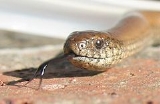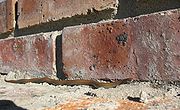
Duberria lutrix
Encyclopedia
Duberria lutrix, or the common slug-eater, is a small, ovoviviparous
, molluscivorous
, non-venomous snake
(adult length approx. 30-40 cm).
.
 As the name implies, the slug-eater is a specialised predator, and feeds on snail
As the name implies, the slug-eater is a specialised predator, and feeds on snail
s and slugs, mostly finding its prey through chemoreception, using its tongue. It swallows its prey quickly before too much defensive mucus
is produced, extracting snails from their shells through the shell opening, or by smashing the shell against a rock while grasping the soft body in its jaws.
The slug-eater's colour varies, but it typically has an olive green to brown or russet back, grey flanks, a yellowish or cream belly, and a more or less complete vertebral stripe.
Ovoviviparity
Ovoviviparity, ovovivipary, or ovivipary, is a mode of reproduction in animals in which embryos develop inside eggs that are retained within the mother's body until they are ready to hatch...
, molluscivorous
Molluscivore
A molluscivore is a carnivorous animal which eats mainly molluscs. The term durophagy is used to describe this eating behavior.Several species of pufferfish and loaches fit this category...
, non-venomous snake
Venomous snake
"Poisonous snake" redirects here. For true poisonous snakes, see Rhabdophis.Venomous snakes are snakes which have venom glands and specialized teeth for the injection of venom...
(adult length approx. 30-40 cm).
Range
The species contains a number of subspecies, including D. lutrix lutrix and Duberria lutrix rhodesiana, which occurs in Zimbabwe and Mozambique, and is found throughout most of Sub-Saharan AfricaSub-Saharan Africa
Sub-Saharan Africa as a geographical term refers to the area of the African continent which lies south of the Sahara. A political definition of Sub-Saharan Africa, instead, covers all African countries which are fully or partially located south of the Sahara...
.
Diet

Snail
Snail is a common name applied to most of the members of the molluscan class Gastropoda that have coiled shells in the adult stage. When the word is used in its most general sense, it includes sea snails, land snails and freshwater snails. The word snail without any qualifier is however more often...
s and slugs, mostly finding its prey through chemoreception, using its tongue. It swallows its prey quickly before too much defensive mucus
Mucus
In vertebrates, mucus is a slippery secretion produced by, and covering, mucous membranes. Mucous fluid is typically produced from mucous cells found in mucous glands. Mucous cells secrete products that are rich in glycoproteins and water. Mucous fluid may also originate from mixed glands, which...
is produced, extracting snails from their shells through the shell opening, or by smashing the shell against a rock while grasping the soft body in its jaws.
Captivity
The snake is a popular pet, feeds and breeds readily and because of the nature of its prey item, it is easy to keep.Defense
When alarmed, the snake secretes a noxious substance from glands near the base of the tail and rolls up into a defensive spiral with the head in the middle, leading to the Afrikaans common name ("tobacco roll").The slug-eater's colour varies, but it typically has an olive green to brown or russet back, grey flanks, a yellowish or cream belly, and a more or less complete vertebral stripe.

